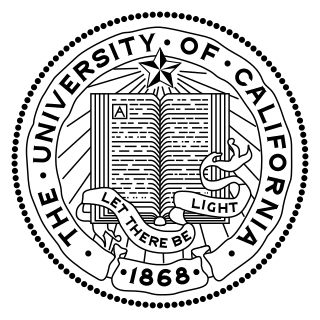
The University of California (UC) is a public land-grant research university system in the U.S. state of California. Headquartered in Oakland, the system is composed of its ten campuses at Berkeley, Davis, Irvine, Los Angeles, Merced, Riverside, San Diego, San Francisco, Santa Barbara, and Santa Cruz, along with numerous research centers and academic abroad centers. The system is the state's land-grant university. Major publications generally rank most UC campuses as being among the best universities in the world. In 1900, UC was one of the founders of the Association of American Universities and since the 1970s seven of its campuses, in addition to Berkeley, have been admitted to the association. Berkeley, Davis, Santa Cruz, Irvine, Los Angeles, Santa Barbara, and San Diego are considered Public Ivies, making California the state with the most universities in the nation to hold the title. UC campuses have large numbers of distinguished faculty in almost every academic discipline, with UC faculty and researchers having won 71 Nobel Prizes as of 2021.

The University of California, Berkeley, is a public land-grant research university in Berkeley, California. It was established in 1868 as the University of California and is the state's first land-grant university and the founding campus of the University of California system. Berkeley has been regarded to be among the top universities worldwide.
Criticism is the construction of a judgement about the negative or positive qualities of someone or something. Criticism can range from impromptu comments to a written detailed response. Criticism falls into several overlapping types including "theoretical, practical, impressionistic, affective, prescriptive, or descriptive".

Gavin Christopher Newsom is an American politician and businessman who has been the 40th governor of California since 2019. A member of the Democratic Party, he served as the 49th lieutenant governor of California from 2011 to 2019 and the 42nd mayor of San Francisco from 2004 to 2011.

People's Park in Berkeley, California is located just east of Telegraph Avenue, bounded by Haste and Bowditch Streets, and Dwight Way, near the University of California, Berkeley. The park was created during the radical political activism of the late 1960s.

E-democracy, also known as digital democracy or Internet democracy, uses information and communication technology (ICT) in political and governance processes. The term is credited to digital activist Steven Clift. By using 21st-century ICT, e-democracy seeks to enhance democracy, including aspects like civic technology and E-government. Proponents argue that by promoting transparency in decision-making processes, e-democracy can empower all citizens to observe and understand the proceedings. Also, if they possess overlooked data, perspectives, or opinions, they can contribute meaningfully. This contribution extends beyond mere informal disconnected debate; it facilitates citizen engagement in the proposal, development, and actual creation of a country's laws. In this way, e-democracy has the potential to incorporate crowdsourced analysis more directly into the policy-making process.
Online consultations or e-consultations refer to an exchange between government and citizens using the Internet. They are one form of online deliberation. Further, online consultation consists in using the Internet to ask a group of people their opinion on one or more specific topics, allowing for trade-offs between participants. Generally, an agency consults a group of people to get their thoughts on an issue when a project or a policy is being developed or implemented, e.g. to identify or access options, or to evaluate ongoing activities. This enables governments to draft more citizen-centered policy.

Kenneth Yigael Goldberg is an American artist, writer, inventor, and researcher in the field of robotics and automation. He is professor and chair of the industrial engineering and operations research department at the University of California, Berkeley, and holds the William S. Floyd Jr. Distinguished Chair in Engineering at Berkeley, with joint appointments in Electrical Engineering and Computer Sciences (EECS), Art Practice, and the School of Information. Goldberg also holds an appointment in the Department of Radiation Oncology at the University of California, San Francisco.
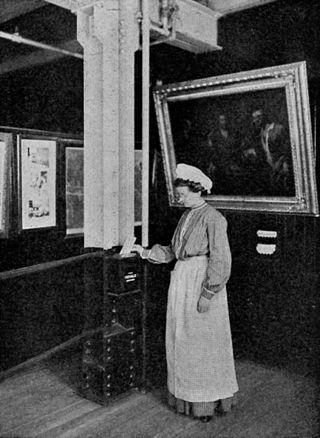
The suggestion box is used for collecting slips of paper with input from customers and patrons of a particular organization. Suggestion boxes may also exist internally, within an organization, such as means for garnering employee opinion.
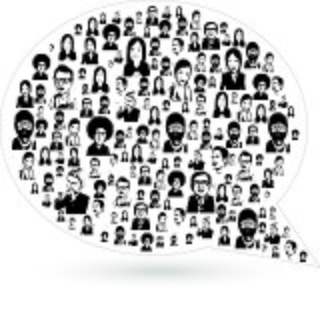
Crowdsourcing involves a large group of dispersed participants contributing or producing goods or services—including ideas, votes, micro-tasks, and finances—for payment or as volunteers. Contemporary crowdsourcing often involves digital platforms to attract and divide work between participants to achieve a cumulative result. Crowdsourcing is not limited to online activity, however, and there are various historical examples of crowdsourcing. The word crowdsourcing is a portmanteau of "crowd" and "outsourcing". In contrast to outsourcing, crowdsourcing usually involves less specific and more public groups of participants.

Nancy Skinner is an American politician and a member of the California State Senate. A Democrat, she represents California's 9th State Senatorial district, encompassing parts of the East Bay.
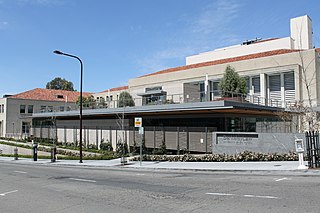
The University of California, Berkeley School of Law is the law school of the University of California, Berkeley. It is one of 14 schools and colleges at the university.
Developed at UC Berkeley, "Opinion Space" is a social media technology designed to help communities generate and exchange ideas about important issues and policies. Version 1.0 was launched on April 4, 2009 at UC Berkeley, and explored the question "Do you think legalizing marijuana is a good idea?" It has since undergone 4 different iterations, and been used in partnership with various organizations including The Occupy movement and the African Robots Network. Opinion Space has also been used in collaboration with the United States State Department and the University of California's Berkeley Center for New Media to gain public perspective on foreign policy issues. Then U.S. Secretary of State Hillary Rodham Clinton explained, "Opinion Space will harness the power of connection technologies to provide a unique forum for international dialogue. This is...an opportunity to extend our engagement beyond the halls of government directly to the people of the world" (2010).
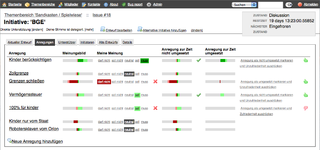
LiquidFeedback is free software for political opinion formation and decision making, combining aspects of representative and direct democracy. Its most important feature is the implementation of a delegated voting system which is to establish a new form of political representation and participation that takes into account the knowledge disparity of its participants.

The Free Speech Movement (FSM) was a massive, long-lasting student protest which took place during the 1964–65 academic year on the campus of the University of California, Berkeley. The Movement was informally under the central leadership of Berkeley graduate student Mario Savio. Other student leaders include Jack Weinberg, Michael Rossman, George Barton, Brian Turner, Bettina Aptheker, Steve Weissman, Michael Teal, Art Goldberg, Jackie Goldberg and others.

The Berkeley Forum, referred to simply as the Forum, is a prominent, non-partisan student organization at the University of California, Berkeley. Founded in 2012, the Forum hosts debates, panels, and talks with distinguished speakers on various topics; it is modeled after similar organizations at other prestigious universities, like the Oxford Union, Cambridge Union, and Yale Political Union.
Online deliberation is a broad term used to describe many forms of non-institutional, institutional and experimental online discussions. The term also describes the emerging field of practice and research related to the design, implementation and study of deliberative processes that rely on the use of electronic information and communications technologies (ICT).
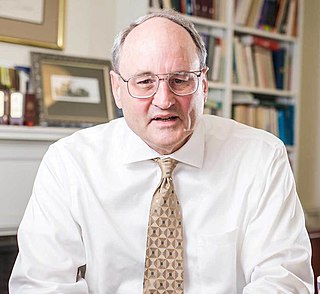
Henry E. Brady is an American political scientist specializing in methodology and its application in a diverse array of political fields. He is Dean of the Goldman School of Public Policy at University of California, Berkeley and holds the Class of 1941 Monroe Deutsch Professor of Political Science and Public Policy. He was elected President of the American Political Science Association, 2009–2010, giving a presidential address entitled "The Art of Political Science: Spatial Diagrams as Iconic and Revelatory." He has published academic works on diverse topics, co-authoring with colleagues at a variety of institutions and ranks, as well as many solo authored works. His principal areas of research are on political behavior in the United States, Canada, and the former Soviet Union, public policy and methodological work on scaling and dimensional analysis. When he became President of the American Political Science Association, a number of his colleagues and co-authors contributed to his presidential biography entitled "Henry Brady, Big Scientist," discussing his work and the fields to which he has contributed and has also shaped.

The COVID-19 pandemic in California began earlier than in some other parts of the United States. Ten of the first 20 confirmed COVID-19 infections in the United States were detected in California, and the first infection was confirmed on January 26, 2020. All of the early confirmed cases were persons who had recently travelled to China, as testing was restricted to this group, but there were some other people infected by that point. A state of emergency was declared in the state on March 4, 2020. A mandatory statewide stay-at-home order was issued on March 19, 2020; it was ended on January 25, 2021. On April 6, 2021, the state announced plans to fully reopen the economy by June 15, 2021.
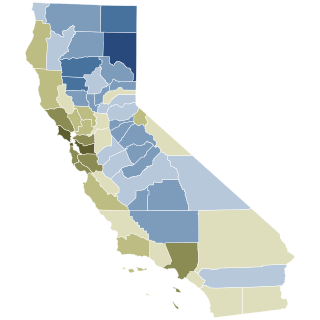
The 2021 California gubernatorial recall election was a special recall election that began in August 2021 and concluded on September 14, 2021, when California voters chose not to recall incumbent Democratic Governor Gavin Newsom, elected for the term January 2019 to January 2023.
















